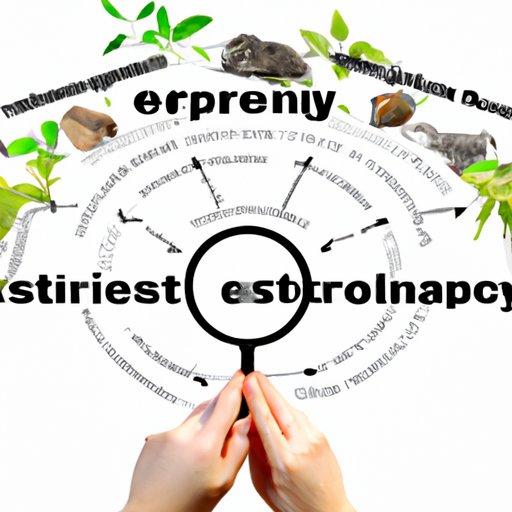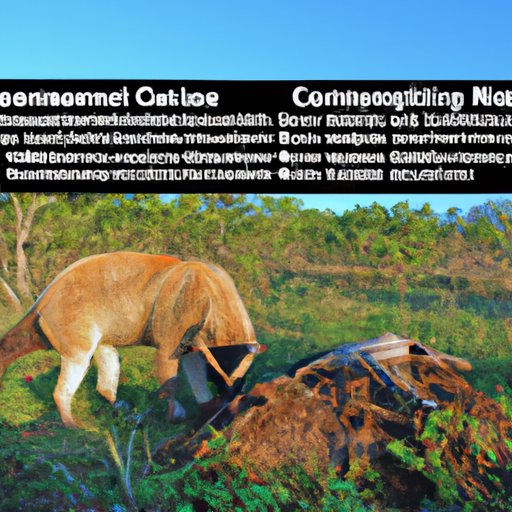Introduction
Ecology is a branch of science that studies the interactions between living organisms and their environment. It explores how species interact with each other and the physical environment, as well as how these relationships influence the distribution and abundance of species. In environmental science, ecology helps us understand the complex relationships between humans and nature, and it provides insights into the impacts of human activities on the environment.

Examining Ecological Systems and Processes
In order to understand how ecosystems function, ecologists analyze the structure and dynamics of species populations within an area. This involves studying the interactions between different species, such as predation, competition, and mutualism. By understanding how species interact with each other, ecologists can gain insight into the complex food webs that exist within ecosystems.
In addition, ecologists investigate the interconnections between species, exploring how changes in one species can affect the entire ecosystem. For example, research has shown that the decline of top predators, such as wolves, can lead to an increase in herbivore populations, resulting in overgrazing and habitat destruction. Understanding these interconnections is essential for preserving biodiversity and maintaining healthy ecosystems.
Investigating the Relationship between Ecology and Climate Change
Climate change is one of the most pressing challenges facing humanity today, and ecology plays an important role in understanding its effects. Ecologists are able to assess the impacts of global warming on local weather patterns, as well as the changes in species distributions due to rising temperatures. They also examine the effects of human activities, such as deforestation and burning fossil fuels, on global climate change.
For instance, research has shown that deforestation can contribute to global warming by reducing the amount of carbon dioxide absorbed by trees. Additionally, burning fossil fuels releases large amounts of carbon dioxide into the atmosphere, which traps heat and leads to an increase in global average temperatures. Understanding these impacts is essential for developing effective strategies for mitigating climate change.
Understanding the Role of Ecological Data in Environmental Decision-Making
Ecological data is increasingly being used to inform environmental decision-making. Ecologists use scientific data to assess the impacts of human activities on ecosystems, such as the effects of pollution on biodiversity. This data can then be used to inform decisions about land management, conservation, and resource use.
Using ecological data to make decisions has several benefits. It allows for more informed decision-making, as it provides insights into the effects of human activities on the environment. Additionally, it reduces the risk of making decisions based on incomplete or inaccurate information. However, some have cautioned against relying too heavily on ecological data, arguing that it can oversimplify complex issues and overlook the potential impacts of human actions on the environment.

Assessing the Benefits of Conservation Efforts for an Ecosystem
Conservation efforts are essential for protecting ecosystems from the impacts of human activities. Preservation of habitats helps to maintain biodiversity and sustain healthy ecosystems. Additionally, sustainable practices, such as reducing pollution and minimizing waste, can help reduce the impacts of human activities on the environment.
For instance, research has shown that reducing air pollution can have positive impacts on biodiversity. Additionally, reducing water pollution can help protect aquatic species and preserve wetland habitats. By implementing conservation efforts, we can help ensure that ecosystems remain healthy and resilient in the face of climate change and other human-caused disturbances.
Conclusion
In conclusion, ecology is an important field of study in environmental science. It helps us understand the complex relationships between living organisms and their environment, and it provides insights into the impacts of human activities on the environment. Furthermore, ecological data can be used to inform environmental decision-making and conservation efforts can help protect ecosystems from the impacts of human activities. Understanding ecology is essential for preserving biodiversity and sustaining healthy ecosystems.
(Note: Is this article not meeting your expectations? Do you have knowledge or insights to share? Unlock new opportunities and expand your reach by joining our authors team. Click Registration to join us and share your expertise with our readers.)
